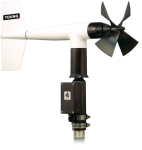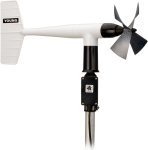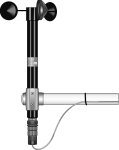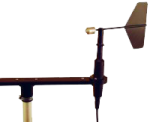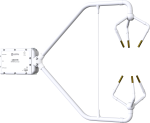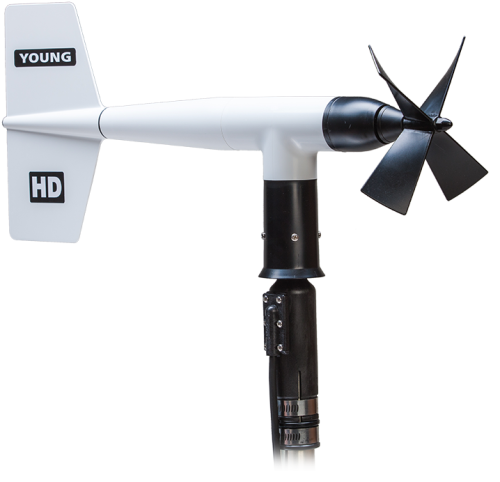
Suitable for marine applications






Overview
The 05108-HD is a lightweight, robust instrument that measures wind speed and direction, designed specifically for your applications where sensor access is limited and conditions are rough. Manufactured by R. M. Young, this wind monitor is cabled for use with Campbell Scientific data loggers.
Read MoreBenefits and Features
- Compatible with most Campbell Scientific data loggers
- Extremely long-wearing, corrosion-resistant, oversized ceramic bearings to increase service life many times longer than standard stainless-steel bearings
- Oversized propeller shaft
- High-pitch propeller
- Locking propeller nut
- Sealed, heavy-duty cable pigtail
- Rugged enough for harsh environments
- Constructed with thermoplastic material that resists corrosion from sea-air environments and atmospheric pollutants
- Compatible with the LLAC4 4-channel Low-Level AC-Conversion Module, which increases the number of anemometers one data logger can measure
- Compatible with the CWS900-series interfaces, allowing it to be used in a wireless sensor network
Images



Detailed Description
The 05108 Wind Monitor-HD is made from rigid UV-stabilized thermoplastic with stainless steel and anodized aluminum fittings. The thermoplastic material resists corrosion from sea air environments and atmospheric pollutants.
To make it more durable, the HD uses extremely long-wearing, oversized ceramic bearings to increase service life many times longer than standard stainless-steel bearings. The wind monitor's ceramic bearings are resistant to corrosion in environments that are hostile to steel bearings, making the 05108-L suitable for marine applications. The HD also has an oversized propeller shaft, high-pitch propeller, locking propeller nut, and sealed, heavy-duty cable pigtail instead of the standard junction box—all features that further enhance the long-term reliability of the sensor.
The 05108 measures wind speed with a helicoid-shaped, four-blade propeller. Rotation of the propeller produces an ac sine wave that has a frequency directly proportional to wind speed. The ac signal is induced in a transducer coil by a six-pole magnet mounted on the propeller shaft. The coil resides on the non-rotating central portion of the main mounting assembly, eliminating the need for slip rings and brushes.
Wind direction is sensed by the orientation of the fuselage-shaped sensor body, which is connected to an internal potentiometer. The data logger applies a known precision excitation voltage to the potentiometer element. The output is an analog voltage signal directly proportional to the azimuth angle.
Similar Products
Compatibility
Please note: The following shows notable compatibility information. It is not a comprehensive list of all compatible products.
Data Loggers
| Compatible | Note | |
|---|---|---|
| CR1000 (retired) | ||
| CR1000X (retired) | ||
| CR200X (retired) | ||
| CR206X (retired) | ||
| CR300 (retired) | ||
| CR3000 (retired) | ||
| CR310 | ||
| CR350 | ||
| CR500 (retired) | Measurements are typically processed for output with the Wind Vector instruction, which is not present in the CR500. | |
| CR6 | ||
| CR800 (retired) | ||
| CR850 (retired) | ||
| CR9000 (retired) | Measurements are typically processed for output with the Wind Vector instruction, which is not present in the CR9000. |
Additional Compatibility Information
Mounting
The 05108-L can be attached to a CM202, CM204, or CM206 crossarm via a 17953 Nu-Rail Crossover Fitting or CM220 Right-Angle Mounting Bracket. Alternatively, HD wind monitors can be attached to the top of our stainless-steel tripods via the CM216 Sensor Mounting Kit.
Wind Profile Studies
Wind profile studies measure many wind sensors. For these applications, the LLAC4 4-Channel Low Level AC Conversion Module can be used to increase the number of Wind Monitors measured by one data logger. The LLAC4 allows data logger control ports to read the wind speed sensor’s ac signals instead of using pulse channels. Data loggers compatible with the LLAC4 are the CR200(X) series (ac signal ≤1 kHz only), CR800, CR850, CR1000, CR3000, and CR5000.
Data Logger Considerations
The 05108's propeller uses one pulse count channel on the data logger. Its wind vane requires one single-ended channel and access to an excitation channel. (The excitation channel can be shared with other high-impedance sensors.)
Programming
The 05108's propeller is measured by the PulseCount Instruction in CRBasic and by Instruction 3 (Pulse Count) in Edlog. The wind vane is measured by the BrHalf Instruction in CRBasic and by Instruction 4 (Excite-Delay-SE) in Edlog. The measurements are typically processed for output with the Wind Vector instruction (not present in the CR500 or CR9000 but present in the CR9000X).
Specifications
| Applications |
|
| Sensor | Helicoid-shaped, 4-blade propeller and fuselage-shaped sensor body |
| Measurement Description | Wind speed and direction |
| Operating Temperature Range | -50° to +60°C (assuming non-riming conditions) |
| Mounting Pipe Description |
|
| Housing Diameter | 5 cm (2.0 in.) |
| Propeller Diameter | 18 cm (7.1 in.) |
| Height | 37 cm (14.6 in.) |
| Length | 55 cm (21.7 in.) |
| Weight | 1.0 kg (2.2 lb) |
Wind Speed |
|
| Range | 0 to 100 m/s (0 to 224 mph) |
| Accuracy | ±0.3 m/s (±0.6 mph) or 1% of reading |
| Starting Threshold | 1.0 m/s (2.2 mph) |
| Distance Constant | 2.7 m (8.9 ft) 63% recovery |
| Output |
AC voltage (3 pulses per revolution) 1800 rpm (90 Hz) = 14.9 m/s (33.3 mph) |
| Resolution | (0.1666 m/s)/(scan rate in seconds) or (0.3726 mph)/(scan rate in seconds) |
Wind Direction |
|
| Mechanical Range | 0 to 360° |
| Electrical Range | 355° (5° open) |
| Accuracy | ±3° |
| Starting Threshold | 1.0 m/s (2.2 mph) at 10° displacement |
| Distance Constant | 1.3 m (4.3 ft) 50% recovery |
| Damping Ratio | 0.25 |
| Damped Natural Wavelength | 7.4 m (24.3 ft) |
| Undamped Natural Wavelength | 7.2 m (23.6 ft) |
| Output |
|
| Voltage | Power switched excitation voltage supplied by data logger |

